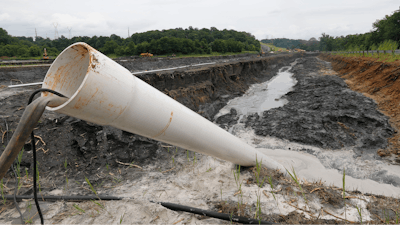
RICHMOND, Va. (AP) — Virginia's largest electric utility is backing a plan to excavate coal ash from unlined ponds after arguing for years that leaving the heavy metal-laden waste product in place was the best option.
Gov. Ralph Northam and a bipartisan group of lawmakers announced an agreement Thursday to require Dominion Energy to recycle or store in lined landfills 27 million cubic yards (20.6 million cubic meters) of coal ash currently located at four sites around the state.
Officials said the plan would cost the average residential customer no more than $5 a month and annual cleanup costs would be capped at $225 million.
Dominion, the state's most politically powerful corporation, said it supported the agreement in a brief statement. The company did not elaborate on why it was changing positions after years of insisting that leaving the coal ash ponds in place and putting a cover over them was safe, economical, and the best available option.
Environmentalists have long argued that unlined coal ash presented an unacceptable hazard. They cheered the deal as a big win for Virginia's water ways that could help prompt other large utilities to follow suit.
"Dominion is stepping out in front and that's encouraging, but Dominion is just one of many," said Lisa Evans, senior counsel with the environmental group Earthjustice.
U.S. coal plants produce about 100 million tons annually of ash and other waste, much of which ends up in unlined disposal ponds prone to leak. Some have been in use for decades.
Last year, the Trump administration eased rules for handling toxic coal ash after utilities pushed back against regulations adopted under former President Barack Obama.
Data released by utilities last year under an Obama-era EPA mandate showed widespread evidence of groundwater contamination at coal plants. Heightened levels of pollutants — including arsenic and radium in some cases — were documented at plants in numerous states, including Virginia.
A 2008 spill in Tennessee drew national attention to coal ash storage. In 2014, a pipe ruptured at a Duke Energy plant in North Carolina, polluting the Dan River with miles of sludge.
A federal investigation found Duke allowed coal ash dumps at five power plants to leak toxic waste into water supplies. Duke pleaded guilty, agreeing to pay fines and restitution. North Carolina now requires recycling as ash ponds close.
"We can't afford an environmental disaster in Virginia like the one North Carolina," said Northam, a Democrat who has made coal ash cleanup a top legislative priority.
The agreement has broad support from a number of key lawmakers, including GOP House Speaker Kirk Cox.
But there is still opposition. Democratic Del. Sam Rasoul said it "doesn't seem fair at all" for ratepayers to have to pay to clean up Dominion's pollution costs. And Virginia Manufacturers Association CEO Brett Vassey said there needs to be greater clarity about the proposal's costs, especially to large Dominion customers.






















